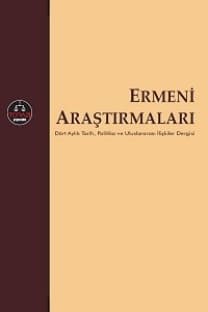ERMENİ MESELESİNDE BİLİMSEL ETİK VE YÖNTEM
Ermeni gazeteci Hrant Dink’in trajik bir suikast sonucu hayatınıkaybetmesinin ardından, Temel Demirer ve Sibel Özbudun tarafından“1.500.001’inci Ahbarik” başlığı altında Ermeni Meselesini ele alan birmakale kaleme alındı. Dink gibi önemli bir şahsiyetin öldürülmesine ahlakiolarak tepki göstermek anlaşılır ve gerekli ise de, yazarlar makalelerinde bununçok ötesine gitmekte ve trajik 1915 olayları üzerine polemiğe girmektedirler.Ayrıca makalede kullanılan alıntılar ve atıfta bulunulan kaynaklarla ilgiliolarak bazı etik sorunlar öne çıkmaktadır. Nitekim yazarların dipnotlarıdikkatle kontrol edildiğinde aslında yazarların referans verdikleri eserlerigörmedikleri ancak bunlara atıfta bulunan başka yazarlardan (referanshatalarıyla birlikte) kopyaladıkları görülmektedir. Bu makale spesifik örneklervererek bu konulara değinecektir
Anahtar Kelimeler:
Temel Demirer, Sibel Özbudun, Ermeni Meselesi, Etik
(THE ARMENIAN QUESTION: SCHOLARLY ETHICS AND METHODOLOGY)
Following the assassination of the renowned Turkish Armenianjournalist Hrant Dink, two Turkish authors, Temel Demirer and Sibel Özbudun,published an article dealing with the Armenian question entitled “1,500,001stAhbarik”. While it is understandable and necessary to express moral outrageover the murder of an important intellectual as Dink, the authors’ article goesbeyond this point, and engages in polemics over the tragic incidents of 1915.Moreover, the quotations and footnote citations presented by the authors intheir article raises certain ethical questions since on close inspection, thesereveal that the authors have not actually seen or checked the sources they cite.Rather the two authors copied the references from different authors withcitation errors and hence without proper acknowledgment. This article willdiscuss these points by presenting specific examples
Keywords:
Temel Demirer, Sibel Özbudun, Armenian Question, Ethics.,
- ISSN: 1303-068X
- Yayın Aralığı: Yılda 2 Sayı
- Başlangıç: 2001
- Yayıncı: Avrasya İncelemeleri Merkezi
